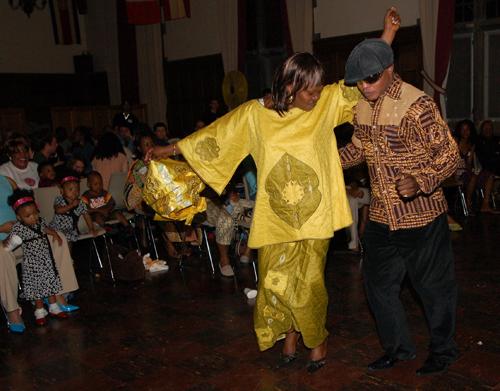Congolese immigrants make transition

Congolese immigrants make transition Erica Magda
Apr 29, 2008
Last updated on May 13, 2016 at 10:30 a.m.
In the Tuesday, April 29 edition of The Daily Illini, in the article titled “Congolese immigrants make transition,” it was reported that most members of the Francophone Community Partnership are of Catholic faith.
The members of the group are not religiously affiliated.
The Daily Illini regrets the error.
The following is the story as it appeared that day.
Get The Daily Illini in your inbox!
French-speaking African immigrants mingled with University students at the YMCA on Friday, eating quiches and beignets while they watched youth groups sway and spin in unison to Congolese music. Most of these immigrants hailed from the Democratic Republic of Congo.
“American people do not know anything at all about Congo. Mostly what they’ve heard is illnesses, like AIDS and Ebola, and war,” said Carine Kemakuko, a resident of Streamwood, Ill., who emigrated from the Congo in 1999.
Kemakuko volunteers for the Congolese Community of Chicago, a nonprofit organization that helped with the event.
“Congo is such a big country … it is shocking when you come here that no one knows about it,” Kemakuko said.
About 400 French-speaking African immigrants live in Champaign-Urbana, and roughly 350 of them are from the Congo.
The Francophone Community Partnership, a 12-member Registered Student Organization, coordinated the event Friday to raise campus awareness about the group, as well as to raise money for a July soccer tournament in the Chicago suburbs to celebrate Congolese independence, said Danielle Ciribassi, president of the partnership and senior in LAS.
The Partnership’s mission is to help African Francophone, or French-speaking, immigrants improve their English skills and gain their footing in the community while aiding cultural exchange between Americans and Congolese, Ciribassi said.
The Francophone Community Partnership leads sessions on Sunday mornings at St. Patrick’s Church in Urbana. Most of the group’s members are of the Catholic faith.
In one room, immigrants conversed with students in halting English, asking for help with job applications and telling stories of their encounters with Americans.
Meanwhile, next door, others heard lessons on how to survive in a culture that is still foreign to them.
Many of the Congolese are fleeing civil war and extreme poverty at home.
The death toll from the ongoing civil war in the Congo has mounted to more than 5 million, although “nobody talks about it,” Kemakuko said.
Rape continues to be used as an instrument of war in the Congo, leaving women physically traumatized, rejected from their communities and often infected with HIV, Kemakuko said.
The violence against women has caused other social problems, such as a growing number of orphans and families split by divorce.
“It’s getting worse and worse,” Kemakuko said. “Today it’s worse than it was two years ago.”
Once in Champaign-Urbana, about 75 percent of Congolese immigrants work factory jobs, said Guy Lombela, a Congolese immigrant and assistant pastor at Stone Creek Church in Urbana. Of these, about 90 percent are students.
These immigrants, accustomed to working as professionals, must adjust their mentality to work factory jobs alongside people who belonged to the ranks of the uneducated lower class at home, he said.
In the Congo, students receive instruction in French, often after learning a regional dialect at home. Public schools receive little funding, and even if students learn English as a foreign language elective in secondary school, their English conversational skills are minimal, Lombela said.
On Sundays, the Francophone Community Partnership teaches immigrants the idioms, expressions and social norms they are not likely to learn in their English as a Second Language classes at Parkland College.
Aside from language differences, immigrants also come to the United States completely unfamiliar with American systems and laws.
“Things like figuring out bus schedules, applying for credit cards and filing for Social Security can be daunting tasks,” Ciribassi said.
Lombela enlists the help of volunteers to do simple tasks for immigrants: picking up immigrants at O’Hare International Airport in Chicago when they arrive from Africa, helping them to find apartments and accompanying them to appointments.
The Francophone Community Partnership hopes to be of further assistance in finding out what Congolese immigrants need and linking them to resources. The group recently began sending volunteers to supervise children during the prayer sessions that Lombela leads at Stone Creek Church on Saturday nights, Ciribassi said.
Next on the agenda is a welcome package for immigrants that will include MTD bus schedules and French-English dictionaries.
“We’re just getting started,” Ciribassi said.





